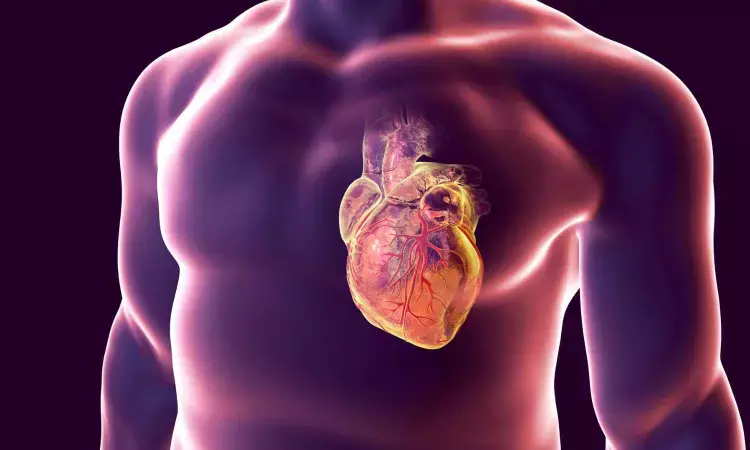- Home
- Medical news & Guidelines
- Anesthesiology
- Cardiology and CTVS
- Critical Care
- Dentistry
- Dermatology
- Diabetes and Endocrinology
- ENT
- Gastroenterology
- Medicine
- Nephrology
- Neurology
- Obstretics-Gynaecology
- Oncology
- Ophthalmology
- Orthopaedics
- Pediatrics-Neonatology
- Psychiatry
- Pulmonology
- Radiology
- Surgery
- Urology
- Laboratory Medicine
- Diet
- Nursing
- Paramedical
- Physiotherapy
- Health news
- Fact Check
- Bone Health Fact Check
- Brain Health Fact Check
- Cancer Related Fact Check
- Child Care Fact Check
- Dental and oral health fact check
- Diabetes and metabolic health fact check
- Diet and Nutrition Fact Check
- Eye and ENT Care Fact Check
- Fitness fact check
- Gut health fact check
- Heart health fact check
- Kidney health fact check
- Medical education fact check
- Men's health fact check
- Respiratory fact check
- Skin and hair care fact check
- Vaccine and Immunization fact check
- Women's health fact check
- AYUSH
- State News
- Andaman and Nicobar Islands
- Andhra Pradesh
- Arunachal Pradesh
- Assam
- Bihar
- Chandigarh
- Chattisgarh
- Dadra and Nagar Haveli
- Daman and Diu
- Delhi
- Goa
- Gujarat
- Haryana
- Himachal Pradesh
- Jammu & Kashmir
- Jharkhand
- Karnataka
- Kerala
- Ladakh
- Lakshadweep
- Madhya Pradesh
- Maharashtra
- Manipur
- Meghalaya
- Mizoram
- Nagaland
- Odisha
- Puducherry
- Punjab
- Rajasthan
- Sikkim
- Tamil Nadu
- Telangana
- Tripura
- Uttar Pradesh
- Uttrakhand
- West Bengal
- Medical Education
- Industry
Stress test abnormalities may predict both noncardiovascular and cardiovascular mortality

USA: Exercise test abnormalities, such as low functional aerobic capacity, predicted non-cardiovascular causes of death such as cancer in addition to cardiovascular-related deaths, according to a new study from Mayo Clinic published in Mayo Clinic Proceedings.
The treadmill exercise test with electrocardiogram (ECG), also known as an exercise stress test, is one of the most familiar tests in medicine. Exercise testing typically is focused on diagnosing coronary artery disease.
The exercise stress test is noninvasive, easily available and provides important diagnostic information. In addition to the ECG itself, the test produces data on functional aerobic capacity, heart rate recovery and chronotropic index, the standardized measure of heart rate during exercise that reflects age, resting heart rate and fitness.
"In our exercise testing cohort, non-cardiovascular deaths were more frequently observed than cardiovascular deaths," says Thomas Allison, Ph.D., M.P.H., director of Mayo Clinic's Integrated Stress Testing Center and the study's senior author. "Though this was a cardiac stress test, we found that cancer was the leading cause of death, at 38%, whereas only 19% of deaths were cardiovascular. Exercise test results including low exercise capacity, low peak heart rate, and a slow recovery of the heart rate after exercise test were associated with increased mortality."
The study looked at 13,382 patients who had no baseline cardiovascular issues or other serious diseases and who had completed exercise tests at Mayo Clinic between 1993 and 2010, then were followed closely for a median period of 12.7 years.
The findings suggest that clinicians should focus not only on ECG results but on data in the exercise test results such as low functional aerobic capacity, low chronotropic index and abnormal heart rate recovery. Patients should be encouraged to increase their physical activity if these results are atypical, even if the ECG results show no significant cardiovascular-related risk, Dr. Allison says.
Reference:
Nóra Sydó, Umair Iftikhar, Emese Csulak, Ray W. Squires, Kent R. Bailey, Thomas G. Allison, Exercise Test Predicts Both Noncardiovascular and Cardiovascular Death in a Primary Prevention Population, DOI:https://doi.org/10.1016/j.mayocp.2023.05.029.
Dr Kamal Kant Kohli-MBBS, DTCD- a chest specialist with more than 30 years of practice and a flair for writing clinical articles, Dr Kamal Kant Kohli joined Medical Dialogues as a Chief Editor of Medical News. Besides writing articles, as an editor, he proofreads and verifies all the medical content published on Medical Dialogues including those coming from journals, studies,medical conferences,guidelines etc. Email: drkohli@medicaldialogues.in. Contact no. 011-43720751


